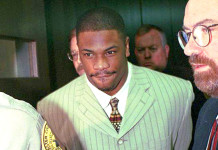Explosive Documentary Links Peyton Manning, Major Athletes To Doping Ring
– The quarterback and his wife received human growth hormone in 2011, an alleged supplier asserts in a new undercover investigation.
By Ryan Grim and Travis Waldron
Washington Bureau Chief, The Huffington Post
An Indianapolis anti-aging clinic supplied quarterback Peyton Manning with human growth hormone, a performance-enhancing drug banned by the NFL, a pharmacist who once worked at the clinic asserts in a new special report from Al Jazeera’s Investigative Unit.
The report, “The Dark Side,” is the result of a monthslong investigation in which Liam Collins, a British hurdler, went undercover in an attempt to expose the widespread nature of performance-enhancing drugs in global sports. As a cover story, Collins tells medical professionals tied to the trade of performance-enhancing drugs that he is hoping for one last shot at glory at the 2016 Olympics in Rio de Janeiro, Brazil. Manning is just one of many high-profile players the report names and raises questions about.
Manning issued a statement Saturday night strongly denying the allegations, claiming that “whoever said this is making stuff up.”
The Denver Broncos also responded to the allegations against Manning, releasing the following statement:
“Knowing Peyton Manning and everything he stands for, the Denver Broncos support him 100 percent. These are false claims made to Al Jazeera, and we don’t believe the report.
Peyton is rightfully outraged by the allegations, which he emphatically denied to our organization and which have been publicly renounced by the source who initially provided them.
Throughout his NFL career, particularly during his four seasons with the Broncos, Peyton has shown nothing but respect for the game. Our organization is confident Peyton does things the right way, and we do not find this story to be credible.”
As part of the investigation, Collins connected with Charlie Sly, a pharmacist based in Austin, Texas, who worked at the Guyer Institute, the Indiana-based anti-aging clinic, in 2011.
Manning missed the 2011 season, when he was a member of the Indianapolis Colts, after undergoing neck surgery. In the documentary, Sly tells Collins, who is taking secret video of his interactions, that he was “part of a medical team that helped [Manning] recover” from the surgery. Sly alleges that the clinic mailed growth hormone and other drugs to Manning’s wife, Ashley Manning, so that the quarterback’s name was never attached to them.
“All the time we would be sending Ashley Manning drugs,” Sly says in the video. “Like growth hormone, all the time, everywhere, Florida. And it would never be under Peyton’s name, it would always be under her name.”
Manning and his wife also came to the clinic after its normal business hours for intravenous treatments, Sly tells Collins on the undercover video.
Manning left the Colts after the 2011 season to sign with Denver. The NFL banned human growth hormone in 1991, but did not begin testing for it until 2014. No player has ever tested positive.
Manning’s agent denied the details of the report to Al Jazeera, calling Sly’s assertions “outrageous and wrong.” But the statement does not deny that growth hormones were shipped to Manning’s wife, only insisting that such matters were a matter of medical privacy.
Manning “has never done what this person is suggesting,” his agent told Al Jazeera. “The treatment he received at the Guyer Institute was provided on the advice of his physician and with the knowledge of team doctors and trainers.”
“Any medical treatment received by Ashley is a private matter of hers, her doctor, and her family,” the agent said.
The credibility of the report hinges largely on whether Sly should be believed, or whether he’s simply concocting stories to impress Collins. Several details lend significant credibility to Sly’s assertions.
First, Sly and the ring he is associated with do, in fact, obtain drugs for Collins, which the network says it retained as evidence.
In a stunning scene, Taylor Teagarden, an eight-year MLB veteran, appears in one of the undercover videos, openly discussing his use of performance-enhancing drugs during the previous season.
Al Jazeera confirmed that Sly did work at the anti-aging clinic that treated Manning; it is difficult to imagine how Sly would have had knowledge of any arrangement to ship drugs to Manning’s wife if he were not operating with genuine insider knowledge. (Sly also describes an interaction with Manning, telling Collins that the quarterback is “really cool if you just sit down with him.”)
Collins, in some ways, was the perfect athlete to put at the center of the operation. He’s no stranger to the shade, having himself been tied up in a fraud scam in recent years.
Beyond the allegations against Manning, the report calls into question the effectiveness of testing regimes meant to prevent performance-enhancing drug use in professional sports, from American leagues to the Olympics.
Collins’ undercover quest took him from the Bahamas, where he connected with a doctor that claimed to supply performance-enhancing drugs to Bahamian Olympic athletes, to Canada, where he met naturopathic physician Brandon Spletzer and pharmacist Chad Robertson, who devised a “cutting edge” drug program for Collins that included up to 10 injections each day.
Collins then connected with Sly, who has “taken smart drugs to a whole new level,” according to Spletzer.
“The Dark Side” paints a picture of an underground marketplace where athletes can easily obtain drugs that are hard to detect even with sophisticated drug tests like those implemented by MLB, the NFL and the Olympics. And it raises questions about how serious the owners of professional sports teams are about rooting out drug use, which can make the games more exciting and profitable, while doing damage to the bodies of players, not owners.
“No one’s got caught, because the system’s so easy to beat,” Robertson, the pharmacist, brags to Collins. “And it still is, that’s the sad fact. I can take a guy with average genetics and make him a world champion.”
Robertson designed a program for Collins that included prescription fertility and hormone drugs, other substances labeled as “not for human consumption” and illegal drugs. Sly, meanwhile, preached the effectiveness of Delta-2, a hormone supplement that is “steroidal in nature” but is not an anabolic steroid, according to online product descriptions.
“There’s a bunch of football players who take this, and a bunch of baseball players who take it too,” Sly tells Collins in the documentary.
“Delta-2 is not for use by anybody subject to performance-enhancing drug tests,” state online reviews for the product. Major League Baseball has banned the drug explicitly.
The report does not link Manning to Delta-2, but Sly and Robertson name multiple football players as customers, including Green Bay Packers linebacker Mike Neal. Neal, Sly says, connected him with multiple teammates, including defensive end Julius Peppers. Pittsburgh Steelers linebacker James Harrison is another NFL player he has supplied, Sly says.
Sly also names Philadelphia Phillies first baseman Ryan Howard and Washington Nationals infielder Ryan Zimmerman as players who received the drug from him. He also claims in the report he gave drugs to Mike Tyson.
Delta-2 is designed to stay ahead of drug tests, Sly explains on video. He tells Collins that he provided the drug to Dustin Keller, a tight end who last played for the Miami Dolphins and allegedly used Delta-2 while in college at Purdue University and then before the NFL Combine, according to Sly. (Keller did not respond to Al Jazeera’s requests for comment).
“We just used Delta-2 because it wasn’t detectable,” Sly says.
Sly also says that he provided Clay Matthews, Green Bay’s Pro Bowl linebacker, with the prescription painkiller Percocet to help him deal with pain before at least one game. He also brags in one undercover video that Matthews texted him in an attempt to obtain Toradol, a powerful painkiller that is banned in many countries but not in the United States.
Harrison, Zimmerman and Howard all denied using the drugs to the network Neal, Peppers, Matthews and Tyson did not respond to Al Jazeera’s request for comment.
Robertson, the pharmacist, and Spletzer, the neuropathic physician, did not respond to Al Jazeera’s request for comment. Sly, when pressed by Al Jazeera, backtracked, saying that his claims about supplying the drugs to athletes were “false and incorrect.”
In a subsequent statement to Al Jazeera, he walked back the comments even further, saying that Collins took advantage of him while Sly was grieving the death of his fiancée.
CORRECTION: A previous version of this article said the NFL banned human growth hormone in 2011. The league actually banned it in 1991. The NFL and its players agreed to begin implementing an HGH testing system in 2011 and began testing in 2014.








